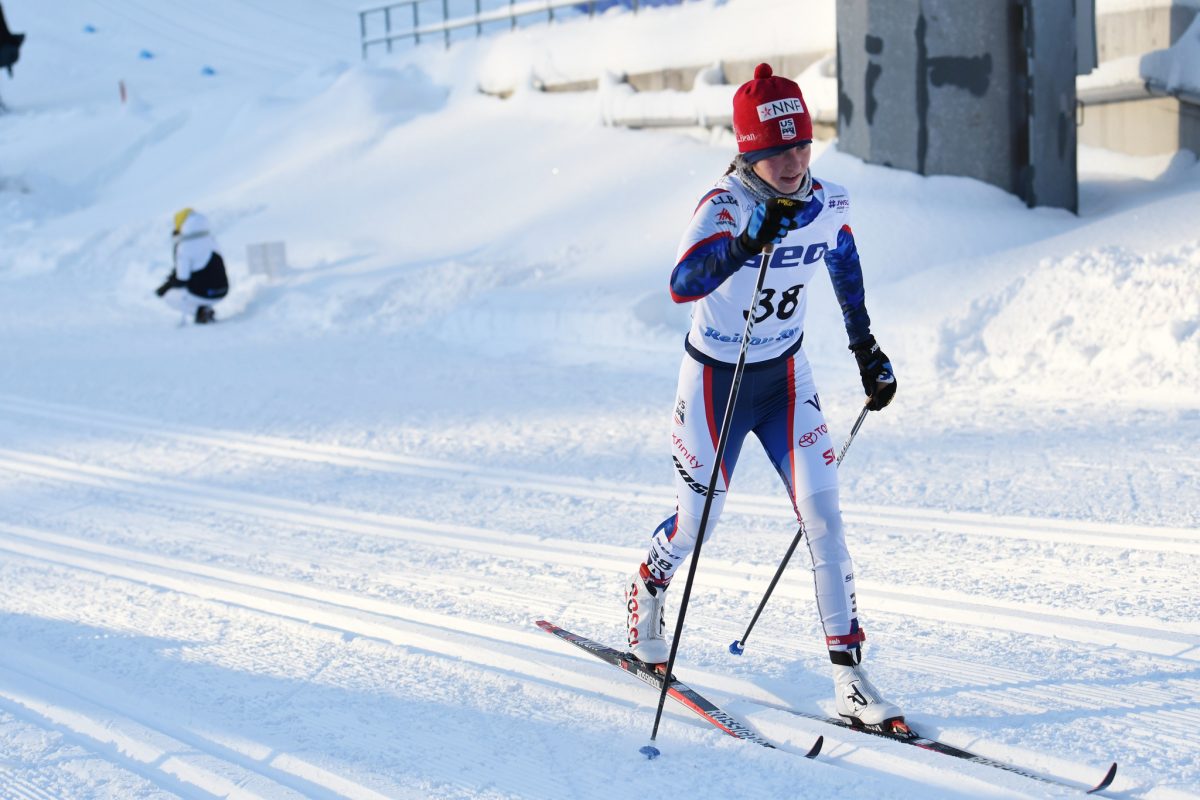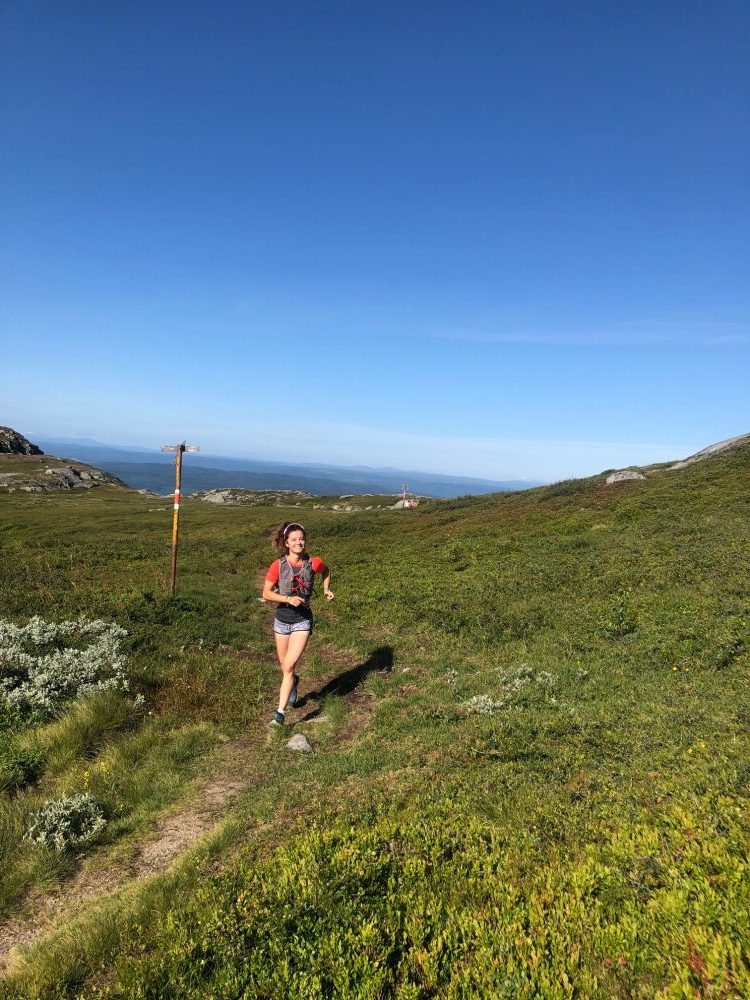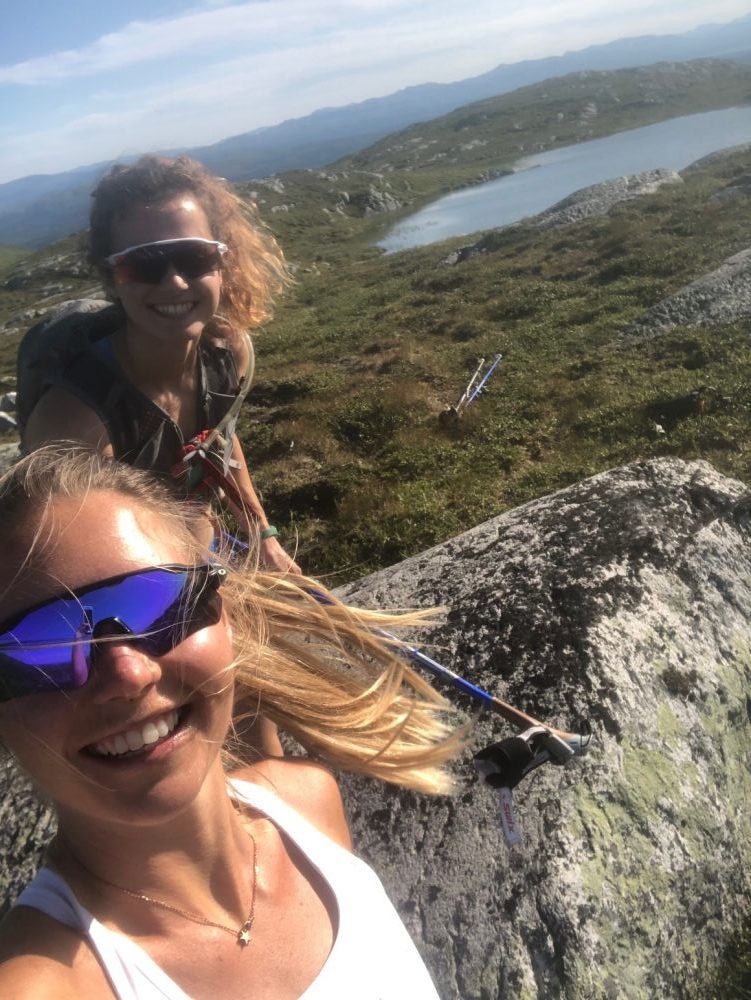
As the title suggests, catching up with Kendall Kramer is no small task. The 17-year-old (as of late June) caught the attention of the cross-country world this past winter with stunning and consistent performances at Lahti, Finland’s Junior World Ski Championships. Although we’re about to rattle off some 2018-2019 results, to be clear this is no athlete who defines themselves solely by the metric of finish rank. That will come across in the interview below.
- 4th at World Juniors in the 15 k classic
- 15th at World Juniors in the 5 k skate
- 4th at World Juniors as part of the 4 x 3.3 k relay along with Mara McCollor, Sydney Palmer-Ledger, and Novie McCabe.
- A clean sweep of the U-18 races at Junior Nationals
- She finished 51st overall at Québec, Canada’s World Cup finals.
And she can run. Kramer is a two-time Alaska state champ in cross-country running and has notched six state titles in track for Fairbanks’ West Valley High School. She is also a top student at her high school.
Kramer has spent the last few weeks running and dryland training in Sweden. During her time there, she entered the Ulvang Kvartsmaraton, a 13.5 k mountain running race in Åre, Sweden, where she placed second among a field of 159 competitors. We spoke with Kramer over the phone on August 7. By know, she is back in the north country of Fairbanks.
FasterSkier: It is often articulated to runners that cross-country skiing will develop too much bulk on the upper body. Conversely, dual-sport athletes often hear that running season goes too long into the fall season. Have you heard those types of comments despite the fact that you are successful in both sports?
Kendall Kramer: So those things have been said to me since freshman year since I began getting competitive in skiing. They say cross-country running races go too late into the season too close to ski season, the national cross-country running races are in November and December.
They are like, ‘if you are in running shape you are not going to have the build for skiing or your technique is going to get off,’ or stuff like that. I have had to ignore both my ski coaches and running coaches, not to pick on one or the other.
FS: How are you balancing the two sports?
KK: I think if I am in running season or in the middle of my hard training for the ski season and I am training with my running group, it is awesome because it gets my mind off of it. When I am running, I am training with other people who don’t know anything about skiing and it is really refreshing from talking about skiing all the time.
The then that gets me excited for ski season — an excitement that might be hindering if I was really grinding and training the whole time for one or the other the whole time.
And so what I find, for now, is that when I am training for running while I am also ski training, I make a point of doing running practice every day because I love it and I love the team. But I will rollerski home from practice, or I will do strength after practice.
On the weekends if I don’t have a running race, I will do super long rollerskis to get time in on that. Running, for me, I think it is just great training. I have been doing more of it as the years have gone on, even though more and more people are telling me to specialize. I think running helps a lot with speed and just pure endurance. It is just shorter workouts that you cannot really get from skiing.
FS: Seventeen and a lot on your plate. How do your parents counsel you as you try to balance all of this?
KK: My dad went to college for track and field, my mom has never skied a day in her life. They are taking the long-term approach: they did not let me go to the Bend ski camp because they don’t want me to dive head first into all these U.S. Ski Team activities because I have so many more years to do it. They want to keep me where my age is. I know I have been progressing rapidly every year, so they settle me and I may protest it, but in the end, it is what is best for me.
They also advised me on if I wanted to do skiing year round freshman year. Because before I did cross-country running and skiing and realized that I could do both and have success in both, I just wanted to ski. I thought you couldn’t do both well. But my parents did not sign me up for my club ski team that fall because they wanted me to try out cross-country running. I was really mad at them but, it turned out great.

FS: OK, before we get to what you have been up to in Sweden, what does the rest of the summer look like for you?
KK: I head back to Alaska next week and will do some training in Fairbanks with my ski group FXC. It is an awesome training group, and I would be fine staying with them the entire summer and Alasdair Tutt is an amazing coach. He is coaching at a ski school in Davos next year, this is his last week as our coach. I want to head right back home and get the last bit of coaching I can from him.
And then, cross-country running starts. The first race is in like 20 days and the state cross country running race is on October first. Then I am traveling down to California for a cross-country running race.
FS: You will be a senior this year and you are also a member of the U.S. Ski Team Development Team. What are your thoughts about the semi-distant future?
KK: There is definitely a lot of pressure to commit to something in the next three months. It turns out I want something completely different at the end of this year than I wanted at the beginning of the year. At the beginning of my junior year, after high school, I wanted to do the whole forgo college thing until I get sick of skiing. But at the end the year I wanted to go to college really badly because I figured out what profession I want to pursue, and that is going to take like 8 years of schooling. I am really excited to start that profession, and I am definitely going to college next year.
I don’t think I could be a full time skier. I definitely need something else going on. I just don’t think I could have only one thing going for me. So I think that the best education that I can get is probably my priority next year.
And NCAAs are pretty controlling and that is kind of putting me off. So I might do the Becca Rorabaugh thing, which is the quarter system and going a quarter at a time. I would like to do a four year school. I am not really going to take a gap year either.
FS: Since you mentioned it, what are you interested in pursuing professionally?
KK: Psychotherapy — like being a therapist and someone who sits down in the office and you work things out. That takes a lot of schooling, a doctorate, and it takes a lot of job shadowing and an apprenticeship. That licensing process can take as much as six years of schooling and one to two years of internship.
FS: That is very specific. What piqued your interest in that?
KK: I think it is super necessary and needed. Especially in this sport where there is a surface layer. And there’s a lot of mental stuff going on underneath that isn’t, cannot really, be talked about in interviews or the newspapers don’t cover them. There is just a lot of mental battling, especially in sport and I know a ton of my friends have to get sport psychology. I get that provided for free being on the U.S. Ski Team. So I am getting some sport psychology work and I think it all starts with how your mind is doing and if it is cluttered then everything is going to be a mess. If it is clear and you can focus on one thing, then things will drastically change, I think.
It is really needed in everybody’s life whether they are an athlete or anything else. I don’t think I will go into sport psychology because I just hear so much of those issues in regular life. I think I would love to get another human perspective on other issues beyond sport psych.
In sport, there’s a lot of focus on physical abilities. But those are nothing if someone is silently burned out in their mind or they cannot push themselves anymore in a race. Or they are just struggling and nobody is talking to them about anything but their athletics or their external issues and stuff like that.

FS: OK, we are catching up with you while you are in Sweden. What are you up to there?
KK: I am staying with the Bångman family near Östersund — one of the sisters is Hedda who skis at CU Boulder, and there are Evelina who is twenty-seven and Tilde. Tilde is my age and got multiple top 10s at junior worlds. I’m training some with the Offerdal Ski Club. It was really good. It was so different from any training I had done in the U.S., just everything they do is at a much faster pace. And their intervals, they don’t do as many intervals but they do them so much faster.
Another thing is that the coaches also don’t come along on all their training sections, they just let them free. Well, they explain what they need to be doing, but then let them free. All of the athletes are so motivated and they know exactly what to do first of all and second of all they want to do even more even without the coach watching them. It is really cool to see.
FS: Why do you think the athletes get more latitude?
KK: I think because there is such a culture surrounding success in sport and sport as a lifestyle. It seems people in the country really believe that and it is easier to just get out the door and motivate yourself independently because there is such hype and respect around sports in general.
FS: Can you talk about the speed of their training — what does that look like and mean for you?
KK: For example, I think they don’t really mind so much about levels, I am not seeing anyone wear heart rate monitors as much as in the US. I haven’ t seen anyone wear a heart rate monitor yet. When they are doing intervals they are very competitive. They are going to go as fast as they can for that entire duration, even if it is just a short workout. When they are going easy they are going a lot easier than we do in my experience in America.
Maybe sometimes in America, we are trying to overcompensate: that if we go slow we are going to train our bodies to go slowly. But really it is just saving your body for having higher quality intervals and that is what I have noticed here. They can go so much faster and go more of a race pace when they actually need to.
FS: Are any of them surprised to hear about the success of the Americans at World Juniors?
KK: They have a pretty high standard for American skiers. I brought up the boys relay at Junior Worlds because I assume that everyone knows about that, yeah they were not surprised. I got a few comments about how they were glad they had won because Norway needs to stop getting so used to it. They told me if it is going to be an international sport then they are glad a World Cup is coming to the U.S. this year. They want the sport to be international and not so centered in Scandinavia.
Jason Albert
Jason lives in Bend, Ore., and can often be seen chasing his two boys around town. He’s a self-proclaimed audio geek. That all started back in the early 1990s when he convinced a naive public radio editor he should report a story from Alaska’s, Ruth Gorge. Now, Jason’s common companion is his field-recording gear.



